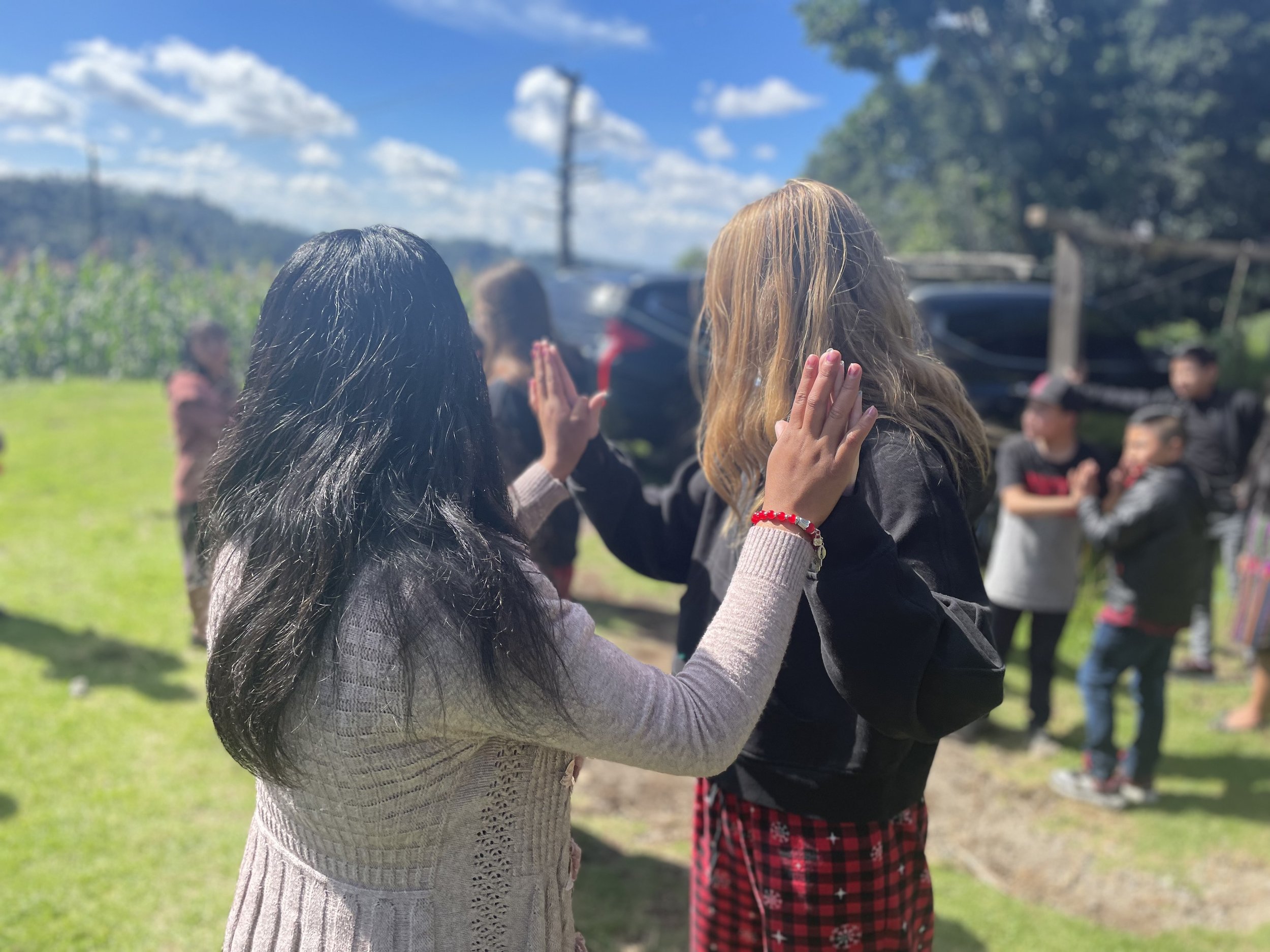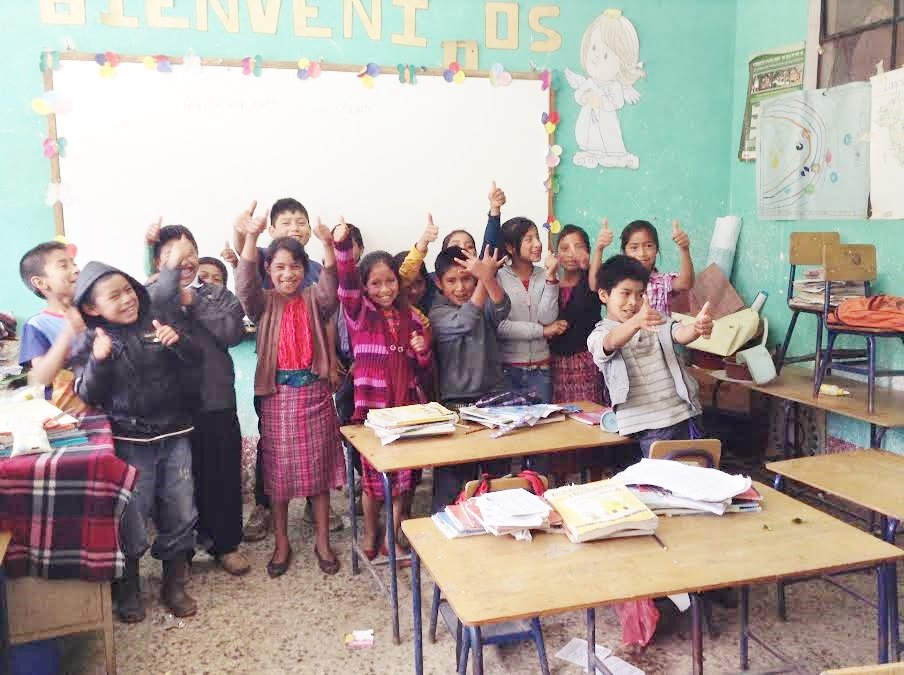Engaging in Discipleship in a Post-Colonial World
Partners in Mission in Gautemala (PIMIG)
I first went to Guatemala with Partners in Mission when I was sixteen. I had never been to this part of the world, and I had never seen anything like what I was to witness on this trip. I would learn so much about the world, about the magic of people, about the systems designed to ensnare. I’d like to talk a bit about these themes today and propose how we can translate our faith into work that liberates others and reflects our values.
Immediately upon entering the village, you can see that a central figure to life there is maize. Ten-foot-tall corn stalks tower over everyone, and no meal is complete without a mountain of hand-shaped tortillas. Maize is in the home, its stalks providing good thatching for roofs. And it’s in the heart, starring as the centerpiece of many a ceremonial dance. Maize is a unifying force, an object of ritual: every day, the women stand around the stove for hours, slapping balls of wet maize back and forth to form tortillas as they swap stories in K’iche’. Over lunch, my male friends jokingly brag about the number of tortillas they consume at lunchtime.
Despite the abundance of this precious crop, there is overwhelming need in the community. The fangs of colonialism ran deep, and drawing out the venom is slow, slow work. Guatemala eventually won its independence in 1821, but discrimination against the indigenous peoples remains, assuming clever new forms when the standards of modernity command it to evolve. Today, that looks like unreliable public transport, unsafe living conditions, and dire water scarcity in indigenous regions. It looks like withholding essential resources from rural schools that might encourage attendance—and during Covid, closing these disadvantaged schools altogether for the entire academic year. It looks like blocking indigenous candidates for office and normalizing government corruption at the expense of the country’s most vulnerable. And as recently as the 80s, it looked like open genocide on the Mayan people. The Guatemalan government massacred, tortured, and disappeared tens of thousands of rural Mayans. The people fled to the churches, where priests were forced to broadcast their services on PA systems so that no one might incorrectly assume they were plotting something. As we walk through the village, we can still listen to priests perform the Eucharist over a loudspeaker.
Chujulimul Primary School, Guatemala, 2019
For thirty years, Partners in Mission in Guatemala has been working to help these communities disentangle themselves from a sticky web of oppressive systems as old as Pedro de Alvarado’s conquest of the K’iche’. Together, we and our partners in these villages have installed hundreds of stoves and dozens of latrines. We helped with food distributions during Covid, when the government shut down all business and transportation with no plan for supporting those who live hand to mouth. Most importantly, our friends remind us, we help with education: through scholarships and school construction projects, we help lift up the next generation of leaders by lifting them up in their learning.
This progress is important, but it is only the result of the real work: listening. PIMIG matches resources with need, and the critical ingredient to identifying that need is shedding what we think we know and trusting in what our friends do.
Allow an example. Years ago, we were working with the community to improve the school. There had been an influx of new students due to population growth, and more space was needed to accommodate them. Together, we built a new schoolhouse, and our community partners were thrilled. We sat down with them to discuss the next project, which seemed obvious to us: build another schoolhouse. The need was still great, and there was no indication that demand was expected to slow. But our friends told us that they had been thinking, and the next project they wanted to undertake was none other than a wall. Not a building—just a wall, running around the perimeter of the school.
We were surprised; a wall couldn’t hold another classroom of students. As far as we could see, it didn’t directly contribute to improved school performance or attendance. It didn’t feel like a pressing issue, and that made it hard to justify the use of funds. We tried to probe them. Why a wall? What did they hope to achieve? Safety, they told us. A wall provided safety. We hesitated, but chose to listen. Chose to trust.
When the wall was completed, we understood. There was indeed an element of safety that we couldn’t see, couldn’t understand, from our perspective. Our initial reservations had had us wondering how much safety a wall could really provide. Couldn’t bad people just climb over? we thought. But it was much more than that. Every elementary school in the area had a security wall; to not have one felt almost like an invitation. The perceived sense of impenetrability to would-be trespassers directly translated to a very real sense of security for community members. The real and perceived improvement to school safety resulted in an instant air of dignity at the school. Since the construction of the wall, community leaders have added many more improvements to the school, including another building and a second floor to the community building on the premises. We have attended countless community-wide events within those school walls, where we can see how proud the people are of their school. With that comes a visible sense of pride in themselves.
Chujulimul Primary School, Guatemala
Our metric for knowledge tends to be very linear. We think in numbers of degrees; we look for precedent-setting cases to guide us in moments of uncertainty. We put our faith in deductive reasoning, trust that it will always guide us to some approximation of “The Truth.” But it is important not to get trapped in this model of reasoning, because it ignores an ocean of knowledge that we may not understand. We must instead choose to listen, for failing to listen to the descendants of the colonized only creates a second tragedy of hubris.
There are many rich, diverse ways of knowing that exist around us. In the communities we visit, knowledge is profound, ancient, shared. We trust this knowledge; we trust our friends. And I am of the mind that if we lead with listening, we lead with love. And if we lead with love, we inch our way closer to a world where all are empowered, where all are free.
Mary Hearding, PIMIG Executive Committee member



